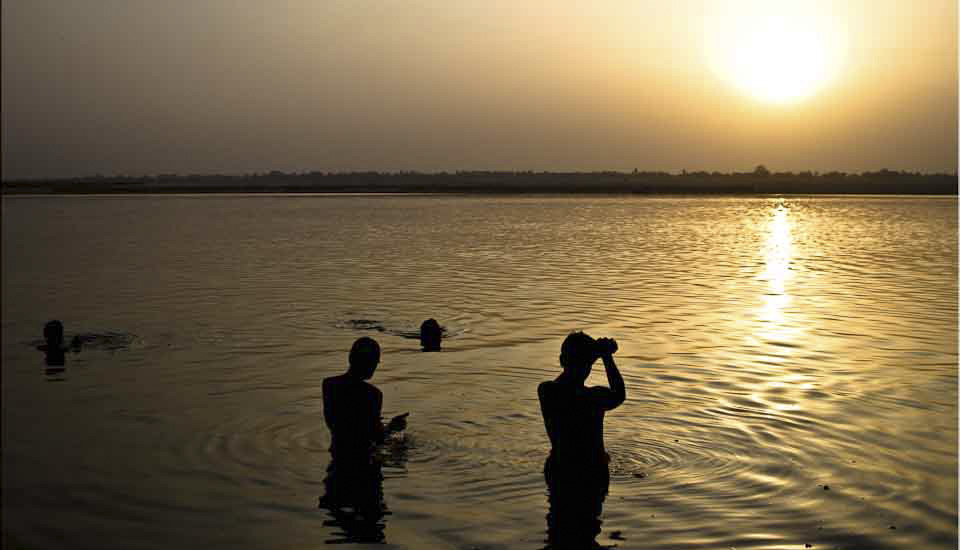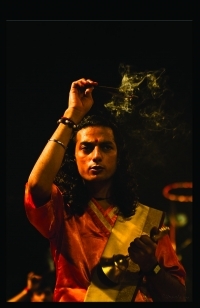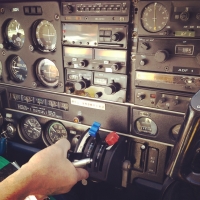.jpg)
A Tender at the Beach
One of our two excursion tenders, Xplorer One, approaches the beach, on the uninhabited island of Wayag (Wajag) in Raja Ampat, Southwest Papua province, Indonesia.
We were in the doldrums.
Quite literally. For three days, we chugged along slowly, never much more than a few degrees off the equator. Our last stop in ‘civilization’ had been in the village of Kwatisore on Cenderawasih Bay (see: Kwatisore Bay and Village).
Fortunately, unlike the ancient mariners of poems, tales, and old history books, we were not reliant on wind for our propulsion in these chancy tropical waters.
Unfortunately, our vessel, the Australian-registered Coral Geographer, had experienced a serious malfunction on day three of what was to be a 19-day voyage through the Spice Islands and Raja Ampat in Indonesia’s westernmost Papua provinces. Our progress was slow, and our direction had had to be adjusted in order to return to our starting point of Sorong to collect parts and a specialist technician. To complicate matters further, it was Ramadan in a predominantly Muslim country.
But, unlike the intrepid sailors from Portugal, Holland, and England who braved these waters in wooden sailboats in the 16th and 17th in search of precious spices, we were at no risk of scurvy or starvation, and at very little risk of warfare (for a history of the Spice Wars, see: Nathaniel’s Nutmeg).
And, we were in some of the most beautiful waters in the world: dotted with islands and teeming with jagged reefs – reefs that had made life so treacherous for those early sailors, but which supplied us with snorkel and dive opportunities a-plenty.
I had bought myself a waterproof silicone phone cover especially for this trip. While it kept my phone dry during trips in the small open boats, it also rendered the buttons pretty unresponsive to my commands. On these particular days, I managed no underwater-shots worth keeping. So, to give you a taste of the remarkable diversity, I’ve included a couple of shots taken by other people who had proper underwater equipment.
Do join me in the middle of nowhere, somewhere along the equator.
.jpg)
Island in Cenderawasih Bay
Slowly, our ship pulls out of Cenderawasih Bay to cruise back around Papua’s Bird’s Head Peninsula. Tropical Islands of varying sizes are everywhere. (iPhone15Pro)
.png)
NMI : Reef around Pulau Manim
We had a morning snorkel on the reef around the tiny island of Manim. The corals are wildly colourful and varied. My photos were all blurry, so I’ve borrowed this one from guest lecturer Dr Jeremy Robertson.

White Sands and Turquoise Waters
After lunch on our ship, we head out again on the tenders: this time for a beach landing on Pulau Manim. The colours are incredible! (iPhone15Pro)

Jungle Behind the Beach
The beach is narrow; a few steps from the water’s edge, I walk into a thriving, lush rainforest environment. (iPhone15Pro)

Buttress Roots
Spreading buttress roots act as stabilizers for the tall trees in the unstable sandy ground. (iPhone15Pro)

Ship on the Horizon
Our ship is anchored out in deeper waters offshore. (iPhone15Pro)

Trees over the Shoreline
Nothing says ‘tropics’ to me like screw pines (Pandanus tectorius) and mangroves leaning out over a white beach and crystal-clear waters. (iPhone15Pro)

Islands through the Window
Two days later, we were finally back over the top of the Bird’s Head Peninsula (Doberai Peninsula) and into the fabled Kepulauan Raja Ampat – the Four Kings Archipelago. (iPhone15Pro)

NMI : Finding Nemo
We went for a morning snorkel in what is (rightly!) billed as an area of sea containing the richest marine biodiversity on earth. The sights and colours were extraordinarily vibrant and varied – but my photos were pretty dull and I’ve borrowed this one from staff-member Sara.

Schooner
After lunch back on board, we set off again for a cruise through the beautiful National Park waters around the island of Wayag (Wajag). We are not the only ones here, but it is remarkably quiet.

In the Wayag Archipelago
Geographically, these remarkable karst islands straddle three major tectonic plates: the Sahul (Australasian), Sunda, and Eurasian plates.

Emerald Waters
The colours and textures are incredible!

Tiny Orchids on the Karst Cliffs
These islands sit in Wallacea, that self-contained biogeographical region with a unique mix of Asian and Australian flora and fauna.

Karst Islands
Tectonic and volcanic activity has led to the uplift of the limestone islands, and karstification (erosion by slightly acidic rainwater) has carved them into an enormous variety of shapes .

Islands in our Wake
We are surrounded by countless uninhabited outcrops. The colours change with every shifting cloud and shadow.

Boats and Islands on the Horizon
We land on a small, sandy beach; rather than go snorkelling again, I take a kayak out for a paddle. (iPhone15Pro)

Wild Orchids on the Cliff
From the kayak, I can get closer to the sharp and rugged cliffs. (iPhone15Pro)

Beach on an Uninhabited Island
Even with most of our ship-load of passengers ashore, the island feels almost deserted.

Last Light
The afternoon draws to a close, and we make our way back to our ship.

Sunset over the Wayag Archipelago

Back to the Ship
Our vessel is ready and waiting – dinner won’t be long!

Selfie in a Sunset Sky
Sundown is fast in the tropics – blink and you’ll miss it! (iPhone15Pro)
Truly, a beautiful region.
And made even better by the almost total lack of infrastructure or development.

Of course, we were carrying plenty of our own food and drink – and so were cruising these magical waters in absolute comfort.
Albeit, very slowly!
Photos: 25and27March2025






























.jpg)

